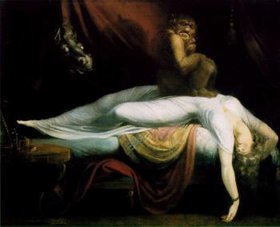Sleep paralysis
|
|
Sleep paralysis is a term either used to describe the normal paralysis of the body that occurs during REM sleep, or the disorder in which awareness is maintained when the body becomes paralysed when entering sleep (known as hypnogogic paralysis) or remains inappropriately paralysed when awakening (known as hypnopompic paralysis). To differentiate normal sleep paralysis and the disorder, the term for the sleep disorder is often referred to as awareness during sleep paralysis.
| Contents |
Normal sleep paralysis
Normal sleep paralysis is thought to be due to mechanisms in the brain stem, particularly the reticular, vestibular, and oculomotor neurons, which prevent bodily movements, block sensory input and provide the forebrain with the internally generated activity that characterises brain activity during REM sleep. This is thought to be necessary to prevent the body from moving in response to dream stimuli. Eyes however are not paralyzed by this system, and this exception was used to prove that lucid dreaming was an objectively verifiable phenomenon.
Awareness during sleep paralysis

The disorder known as "sleep paralysis" occurs when the brain is awakened from a REM state into essentially a normal fully awake state, but the bodily paralysis is still occurring. This causes the person to be fully aware, but unable to move. In addition, this state is usually accompanied by certain specific kinds of hallucinations. This state usually lasts no more than two minutes before a person is able to either return to full REM sleep or to become fully awake, though the sense of how much time has gone by is often distorted during sleep paralysis. People who are fortunate enough to be facing a clock while having an episode may often be surprised to see how little time has gone by during an episode that seems to last a very long time.
Accompanying hallucinations
Many report hallucinations during these episodes. The features of these hallucinations generally vary by individual, but some are more common to the experience than others:
Most common
- Vividness
- Fear
Common
- Sensing a "presence" (often malevolent)
- Pressure/weight on body (especially the chest)
- Impending sense of doom/death
Fairly common
- Auditory hallucinations (often footsteps or indistinct voices, or pulsing noises)
- Visual hallucinations such as people or shadows walking around the room
Less common
- Floating sensation (sometimes associated with out-of-body experiences)
- Seemingly seamless transition into full hallucinations or dreaming, also associated with out-of-body experiences
- Tactile hallucinations (such as a hand touching or grabbing)
Rare
- Falling sensation
- Vibration
Possible causes
Little is known about the physiology of awareness during sleep paralysis. However, some have suggested that it may be linked to post synaptic inhibition of motor neurons in the pons region of the brain. In particular, low levels of melatonin may stop the depolarisation current in the nerves, which prevents the stimulation of the muscles.
There is also a significant positive correlation between those experiencing this disorder frequently and those suffering from narcolepsy. However, various studies suggest that many or most people will experience sleep paralysis at least once or twice in their lives.
Some report that various factors increase the likelihood of both paralysis and hallucinations. These include:
- Sleeping in a supine position
- Irregular sleeping schedules; naps, sleeping in
- Increased stress
- Sudden environmental/lifestyle changes
Cultural references
In Japan, awareness during sleep paralysis is referred to as kanashibari (literally: "bound or fastened in metal": kana: metal, shibaru: to bind, tie, fasten"); in Canada (Newfoundland), as a visit from the "old hag" (Ag Rog); in Mexico, as subida del muerto (the dead getting on top); in Turkish, as karabasan (black buster) and in Hazaragi, as Syahi Zer Kado (pressing ink).
In medieval times of Europe, attacks of sufferers of sleep paralysis may have given rise to the belief in mara, incubi, succubi, other demons and witchcraft.
In traditional Russian belief symptoms reminiscent of sleep paralysis were attributed to the anger of domovoi, the home spirit, punishing people for bad husbandship or betrayal.
The combination of paralysis and hallucinations has led to speculation that the phenomenon might be a cause of some alien abduction reports, out-of-body experiences, and other seemingly paranormal events.
See also
External links
- Al Cheyne's Sleep Paralysis page (http://www.arts.uwaterloo.ca/~acheyne/S_P.html)
- Susan Blackmore on sleep paralysis (http://www.csicop.org/si/9805/abduction.html)
- The Skeptic's Dictionary entry on Sleep Paralysis (http://www.skepdic.com/sleepparalysis.html)
- Sleep paralysis (http://www.here-be-dreams.com/sleep/paralysis.html) at Here Be Dreams
- Sleep information and links (http://www.stanford.edu/~dement/paralysis.html) from Stanford University
- Sleep Paralysis and Associated Hypnagogic and Hypnopompic Experiences (http://www.arts.uwaterloo.ca/~acheyne/S_P.html) from Waterloo University
- Abduction by Aliens or Sleep Paralysis? (http://www.csicop.org/si/9805/abduction.html) - Skeptical Inquirer magazine, May/June 1998de:Schlaflähmung
es:Parálisis del Sueño fr:Paralysie du sommeil ru:Сонный паралич
